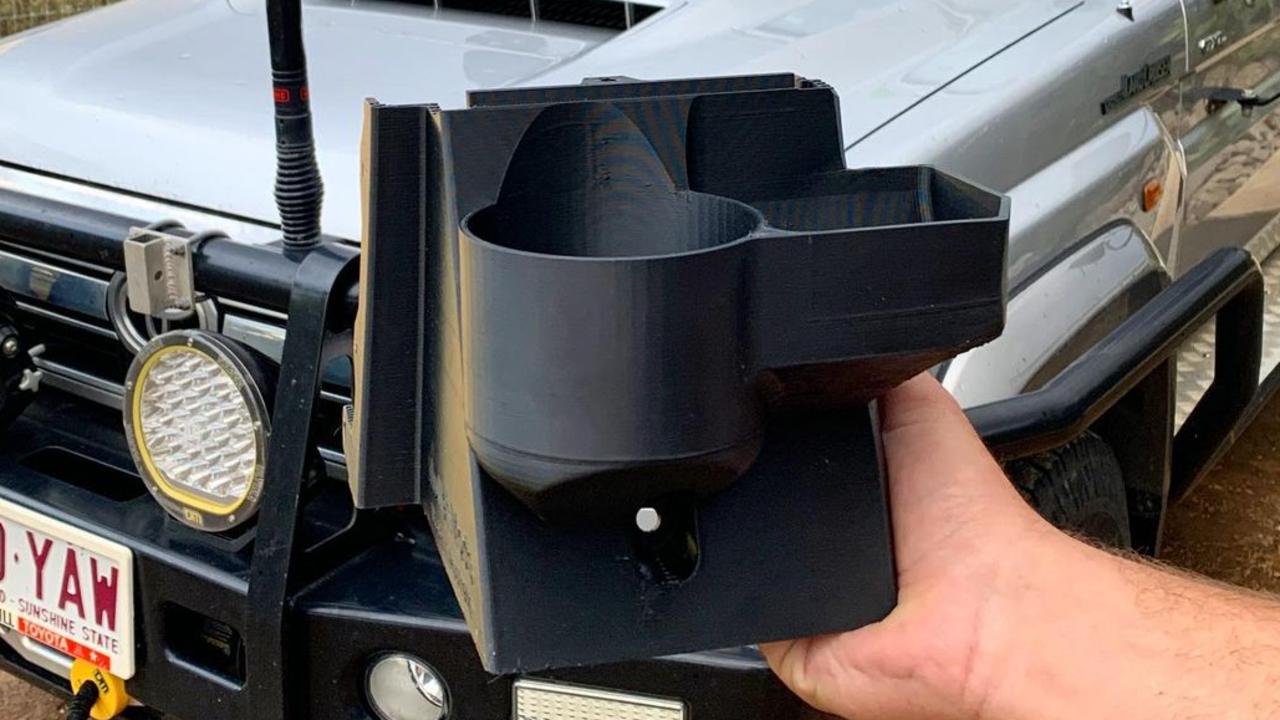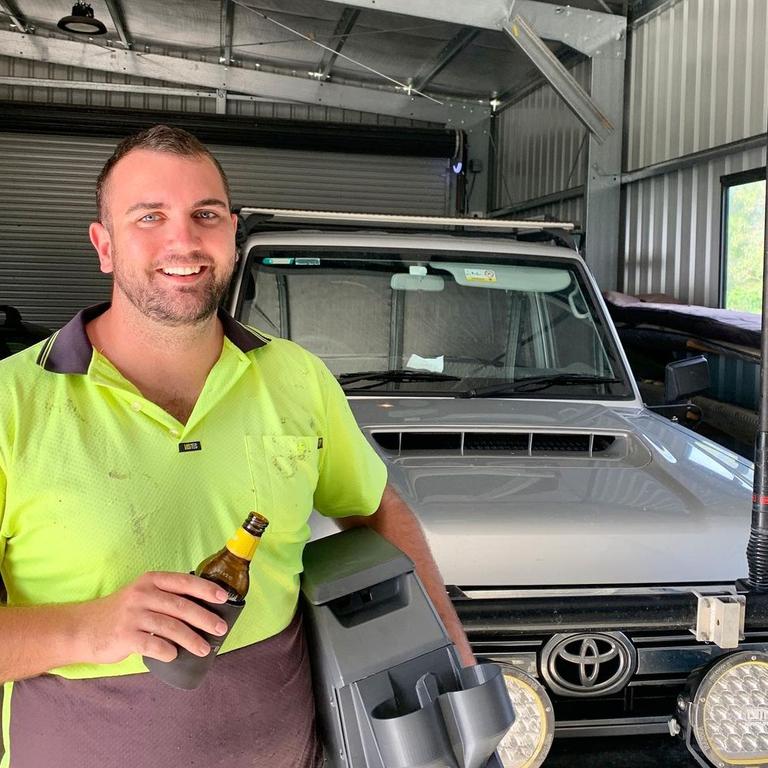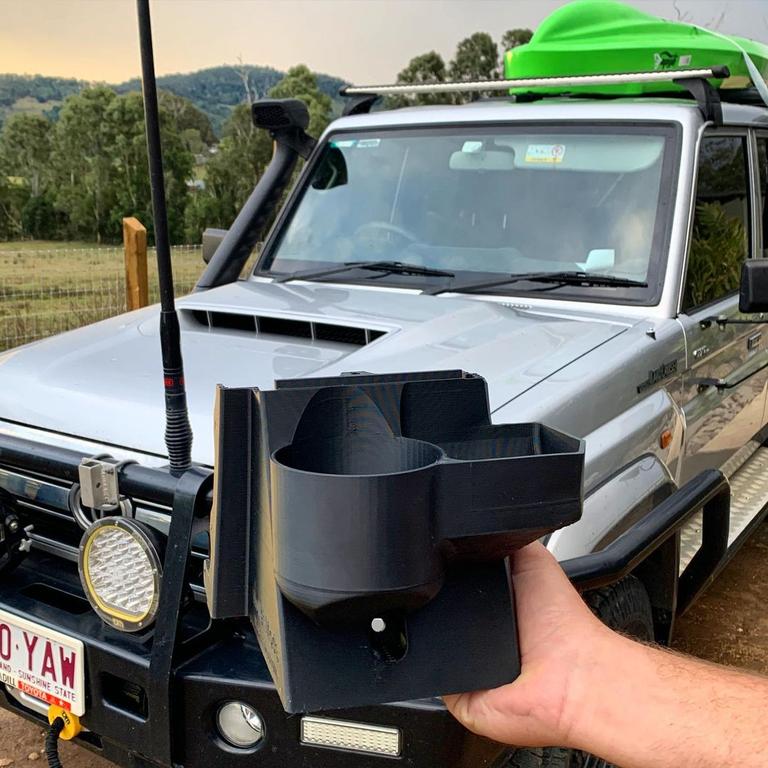How concreter’s $84 LandCruiser car mod made him $70k
When Clay Griffith-Carmichael realised he had fixed a common problem for LandCruiser drivers, he turned his solution into a gold mine.

If you’ve decided that 2021 will be the year you finally action that idea for an online shop or small business, you’re not alone.
According to research from SEEK, 9 per cent of Aussies have made starting a business or side hustle a New Year’s resolution for 2021.
However, for Sunshine Coast man, Clay Griffith-Carmichael, what was a hobby which turned his love of 3D printing into “beer money,” is now his full-time job.
The founder of Mullet Mods, the 23-year-old has created a loyal and dedicated following thanks to his range of 3D-printed cup holders for Toyota LandCruisers. While the product may seem nich, Mr Griffith-Carmichael credited his success to his unique products.
“Drink holders are fine in a majority of cars but they don’t come with this particular 70 series LandCruiser that’s a semi-commercial vehicle and popular in the four-wheel driving scene,” he explained to news.com.au.
“The car comes bare bones and it’s an optional upgrade to get electric windows. That’s how far behind it is.
“It’s quite far behind in terms of comfort but it’s one of the best four wheel drives you can buy.”

Although he began 3D printing the drink holders in 2018, he didn’t consider seriously pursuing his business idea until April 2020 when the onset of COVID-19 began threatening his other income sources. At the time Mr Griffith-Carmichael was working as a tutor at the University of Queensland and concreting on the weekends, however the pandemic quickly saw his hours reduced.
“As a concreter we couldn’t go near the truck drivers and we were just waiting for something to collapse and be off work for two weeks,” he said.
“When the pandemic hit, I had a lot of time. I was stuck at home, I was next to the printer, so it kind of gave me that extra time to work on it.”
He considered his new 3D printing venture to be relatively low-risk too. His initial products were made with a 3D printer he received as a Christmas present in 2016 and Mr Griffith-Carmichael used the sales of his cup holders to purchase additional printers. Being completely Australia-made, the fact he used suppliers from Melbourne also meant Mullet Mods wasn’t affected by global shipping delays either.
“3D printers are pretty cheap in terms of manufacturing equipment and only cost $1500,” he said.
“The business started growing by itself, so I didn’t have to risk my own money and I only started paying myself this year.”
His sister and Sydney-based PR manager Paige Carmichael also helped him use social media marketing to boost awareness of Mullet Mods. Mr Griffith-Carmichael said the results from the Facebook ads were evident “overnight,” with sales increasing from “20 to 60 a month”.
“Being able to show people the cup holders was what transitioned it into a business, I then started actually having growth and that was the biggest factor,” he said.

‘THE TRADITIONAL JOB DOESN’T FEEL AS STABLE AS IT USED TO’
Since April, Mullet Mods has made $70,000 in revenue with the business doubling its growth every quarter. Looking at his motivation for pursuing Mullet Mods, Mr Griffith-Carmichael said his decision was largely financial and came from a desire to be financially independent.
“Honestly it would be money,” he said. “It was just having some money that didn’t come from the traditional means. No one was paying me that money but myself and that was the really exciting bit about it.”
The sudden and substantial impact of COVID-19 on his employment also caused him to reconsider his options.
“I thought that being self-employed wouldn’t be very stable but the pandemic proved that working for other people wasn’t that stable either,” he said.
Today, the former concreter is now focusing on how to expand his business. Growing his inventory to eight 3D printers to keep up with demand, he admitted he’s outgrown his at-home warehouse and office.
“I can’t watch TV and there’s a constant humming sound in the background,” he joked. “I’m now looking at moving into a house with a double garage so I can get double the amount of printers and hire staff for the picking and packing.”
When it comes to advice for people looking at pursuing a side hustle, Mr Griffith-Carmichael said that while being on your own can come with its challenges, the resources and platforms available to beginner business owners do make the e-commerce space more accessible.
“A massive thing for me is that it was really easy to build everything up,” he said.
“In total we spend $90 a month on great e-commerce tools like Shopify and My Post Business, which have been fantastic for us.
“While they were ridiculously expensive five years ago, the barrier to entry is now a lot lower.”
WHAT TO KNOW ABOUT STARTING YOUR OWN SIDE HUSTLE
Whether you’re starting a side hustle with the intention of transitioning your idea into a full-time career or you’re just testing the waters, Melbourne-man Daniel Harrison has been through the process himself.
The owner of three Magic Hand Carwash franchises, he spoke to SEEK Career Advice and shared his top tips on how wannabe business owners can set themselves up for success.
1. Get acquainted with your financial position immediately
While being your own boss can be liberating, many people can find the financial responsibility and potential instability daunting.
“Before considering business ownership, remind yourself that you won’t draw much of an income from the business for at least the first 12 months, so make sure you have a contingency plan to cope with that,” he said.
However, if you can rearrange your existing cash flow and/or savings to cover your living expenses, that knowledge will guarantee you extra peace of mind.
“If you don’t have the cash flow available, consider how you will go about raising funds,” adds Mr Harrison.
2. Ask yourself: ‘Am I afraid of hard work?’
Whether you’re looking at starting a side hustle or considering self-employment, you need to be aware that achieving work-life balance might be difficult in the beginning.
“Working long days is part and parcel of being a business owner, especially in the early days when you’re trying to get your business off the ground,” said Mr Harrison.
“Ultimately the success of the business relies on you – the more you put in, the more you will get out.”

3. Do the research
Once you have a viable product or service you think you can sell, it’s important to understand who your competitors are and how your business idea will cut through the clutter. This is where doing your research comes in.
4. A business plan is paramount
A business plan doesn’t have to be long but it does need to show you’ve thought about the viability and profitability of your business (see step three). Some of the questions it should address include:
Who is the target market for your proposed product or service?
What is the customer need you are responding to, and how does your solution to that need compare with competitors in the market?
What are your revenue sources?
What are your cost items?
How long will it take to bring your product or service to the market?
When will you start to receive sales revenue?
5. Know your limits
Although being an entrepreneur means you’re going to need to upskill in areas you weren’t expecting, being able to delegate and outsource responsibilities will help you manage your time and sanity. This is especially crucial when you begin to grow your business and realise you no longer have the capacity to be across everything, says Mr Harrison.
“As I have taken on more sites I have realised that I can’t possibly be across every aspect of the business, so I have gradually handed over certain responsibilities, such as bookkeeping, accounting, payroll and human resources to external companies,” he said. “This allows me to stay focused on the overall running of the business and also means that the business doesn’t eat into my spare time.”
This article was created in partnership with SEEK



